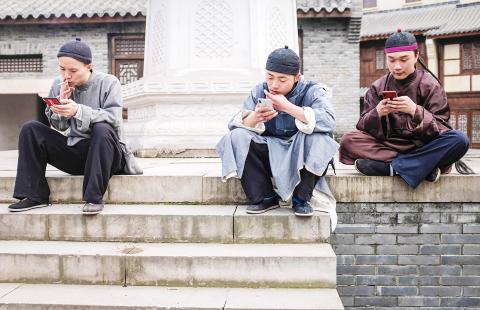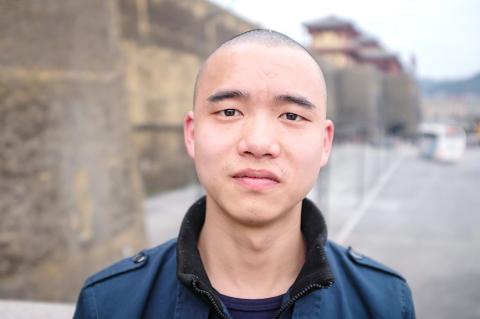Fed up with the drudgery of his sales job in southern China, Lu Qi quit and traveled 1,000km north to one of the country’s biggest film studios with hopes of making it in movies.
That dream remains a work in progress for Lu and thousands like him who eke out a precarious living as extras at Hengdian World Studios.
Just as moviegoers use film to escape reality, so too do many of Hengdian’s army of more than 6,000 extras.

Photo: AFP
“I failed so many times [in sales] and haven’t made much progress,” said Lu, his head shaved bald save for a knit cap keeping it warm.
“Most people here have no degrees, skills or relations. [We] can’t do any business either, so we are just here to escape the reality and the competition out there,” the 24-year-old added.
Hengdian, in Zhejiang Province, was once a poverty-stricken town amid rugged hills, but in the mid-1990s the investment firm Hengdian Group expanded into movies.

Photo: AFP
It bulldozed the landscape and erected the mammoth studio complex, which now claims to be the world’s largest film and TV shooting base.
Sometimes dubbed the “Hollywood of the East” or simply “Chinawood,” local media reported more than 70 percent of China’s films and TV shows have been at least partly shot on a 330-hectare site.
Sets range from ancient palace complexes that can accommodate casts of thousands to contemporary mansions and modern green screens.
“You can complete a Beijing-Hong Kong trip in one day,” Hengdian tour guide Wu Rongrong said as she stood before a life-sized reproduction of Beijing’s Forbidden City while gesturing toward a replica of an old Hong Kong street complete with opium bars.
The studio has been the backdrop for Chinese blockbusters such as Hero (2002) and has been graced by A-listers like Jackie Chan (成龍) and Fan Bingbing (范冰冰).
Its growth has outrun the local supply of manpower.
“At first, we recruited mostly locals as extras. Now the majority of them come from out of town,” said Zhou Fenglai, a Hengdian town official who deals with performer management.
An estimated 6,000 to 8,000 people are on hand daily to serve as extras at Hengdian.
Lian Chunyu grew up on horseback on the plains of Inner Mongolia, before parlaying that experience into work as a Hengdian stunt rider for eight years. Even though his face is never seen in movies, it is still a thrill to be part of it.
“It would be difficult for me to get used to doing something else after this,” he said.
Lu, who spends a few months a year in Hengdian and the rest at home in Guangdong Province, checks his WeChat group messages each morning for studio work, usually finding something daily.
Lu and Lian make about 100 to 200 yuan (US$15 to US$30) per day, enough to cover rent and meals, while those with more acting experience can make more.
Male extras get an additional 40 yuan each time they shave their heads — partly to make sure there is ample manpower for often used scenes requiring the Manchu-style shaved head and braided queue.
As well as the extra cash, Lu also likes that such a specific look rules him out of military roles.
“It’s very uncomfortable running around in the mountains wearing armor and being blown up,” Lu said, comparing it to work as a “coolie.”
Between scenes, Lu shoots videos of himself with props and costumes, which he uploads to social media.
Many of the extras do live online broadcasts and performances, making additional money via digital payments from their followers, he said.
One downside: being barked at and herded like cattle.
“Most film crews are really terrible, cursing people and such. That’s despicable. The bigger the production team, the worse they are,” said Wang Xiaopin, a 47-year-old extra from Henan Province.
“It doesn’t matter how well you perform. In their eyes, you will always be unqualified,” he said.
China’s entertainment sector has blossomed in recent years as the government looks to build up the domestic industry and replace imported foreign content with homegrown fare.
However, many projects have been put on hold after the central government last year began cracking down on alleged widespread tax evasion and exorbitant pay for big-name stars.
That has made work more scarce for now, and while sources at Hengdian say some extras have left, Lu remains optimistic.
“I still want to be an actor,” Lu said. “I believe the future will be better than the past.”

The Burmese junta has said that detained former leader Aung San Suu Kyi is “in good health,” a day after her son said he has received little information about the 80-year-old’s condition and fears she could die without him knowing. In an interview in Tokyo earlier this week, Kim Aris said he had not heard from his mother in years and believes she is being held incommunicado in the capital, Naypyidaw. Aung San Suu Kyi, a Nobel Peace Prize laureate, was detained after a 2021 military coup that ousted her elected civilian government and sparked a civil war. She is serving a

‘NO AMNESTY’: Tens of thousands of people joined the rally against a bill that would slash the former president’s prison term; President Lula has said he would veto the bill Tens of thousands of Brazilians on Sunday demonstrated against a bill that advanced in Congress this week that would reduce the time former president Jair Bolsonaro spends behind bars following his sentence of more than 27 years for attempting a coup. Protests took place in the capital, Brasilia, and in other major cities across the nation, including Sao Paulo, Florianopolis, Salvador and Recife. On Copacabana’s boardwalk in Rio de Janeiro, crowds composed of left-wing voters chanted “No amnesty” and “Out with Hugo Motta,” a reference to the speaker of the lower house, which approved the bill on Wednesday last week. It is

‘EAST SHIELD’: State-run Belma said it would produce up to 6 million mines to lay along Poland’s 800km eastern border, and sell excess to nations bordering Russia and Belarus Poland has decided to start producing anti-personnel mines for the first time since the Cold War, and plans to deploy them along its eastern border and might export them to Ukraine, the deputy defense minister said. Joining a broader regional shift that has seen almost all European countries bordering Russia, with the exception of Norway, announce plans to quit the global treaty banning such weapons, Poland wants to use anti-personnel mines to beef up its borders with Belarus and Russia. “We are interested in large quantities as soon as possible,” Deputy Minister of National Defense Pawel Zalewski said. The mines would be part

Cozy knits, sparkly bobbles and Santa hats were all the canine rage on Sunday, as hundreds of sausage dogs and their owners converged on central London for an annual parade and get-together. The dachshunds’ gathering in London’s Hyde Park came after a previous “Sausage Walk” planned for Halloween had to be postponed, because it had become so popular organizers needed to apply for an events licence. “It was going to be too much fun so they canceled it,” laughed Nicky Bailey, the owner of three sausage dogs: Una and her two 19-week-old puppies Ember and Finnegan, wearing matching red coats and silver